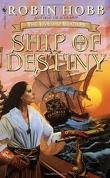 Considering how direly the trilogy started, I am surprised to find myself unequivocally liking the Liveship Traders trilogy better than the Farseer [Assassin] trilogy. The downside being, it will be hard to get into why without spoilers for both trilogies. So I’ll do that below the cut.
Considering how direly the trilogy started, I am surprised to find myself unequivocally liking the Liveship Traders trilogy better than the Farseer [Assassin] trilogy. The downside being, it will be hard to get into why without spoilers for both trilogies. So I’ll do that below the cut.
The quick and dirty here is that Ship of Destiny was a fine conclusion to a rollicking adventure of a trilogy, even if the titular scene was maybe a little contrived. I look forward to reading more books in this world, though maybe not for a year or so? I really do read them distressingly slowly.
So, one problem Fitzchivalry’s story has was how anticlimactic it was, and how many threads were left not just loose but untouched. The Forging, and the raiders doing it, and really the entire threat from the eastern ocean was neutralized at the last second via weird Elderling magical “dragons”, without ever even vaguely being explained. As a result, every sacrifice ultimately felt a little hollow.
The to be fair here is that this was written from the narrator’s viewpoint, and maybe that was how I was supposed to feel? The further to be fair is that perhaps my complaints will be resolved in a future book of the many remaining series.
Anyway, this in stark opposition to the story of the Vestrits. The mysteries of the serpents, the Rain Wilds, and the liveships themselves for that matter, were fully resolved. More, they were resolved with exciting new developments for the world at large, and if everyone didn’t end up as storybook happy as they might have, the ending was definitively a happy one, in which the bad guys were mostly punished and the good guys were mostly rewarded.
Not to mention the part where the characters had layers, some revealed to be much better than I thought and some much worse. Oh, and also the irredeemable prick that made the first book so unbearable was ignominiously pincushioned and then tossed over the side of the boat without much fanfare. So yeah, I’m cool with all of that. (Not to say that the Farseer characters didn’t have layers, but the difference between omniscient and personal narration is stark in this regard. Especially when the personal narrator is unreliable.)
Lastly: I’m still feeling smug about having assumed that Amber was the Fool from almost the very start, despite being pretty sure that Hobb did not intend that leap. I don’t mind being told my smugness is hollow here, but nonetheless, it is mine.